#and another judge homer!
Explore tagged Tumblr posts
Text
we lost but at least we got this cute father/son pic

39 notes
·
View notes
Text

The Judge Soto Show continues as Aaron Judge hits his 46th home run of the season and gets another RBI getting Soto home after they walked him again!!! These two are on fire 🔥 They make the game so exciting. I don't know where the Yankees would be without them. Actually, I do, but I don't like to think about that 😁 I love this game, and I love these guys!! 😍 Let's go Yankees!!!!!
#aaron judge#99#juan soto#22#the Judge Soto Show#46th homer of the year#another RBI#I LOVE THESE GUYS#I love this game#love#happiness#thank you#sharing#baseball#sports#ny yankees#let's go yankees#joy#ny baseball#bronx bombers#incredible#phenomenal athletes#my boys#he did it again#holy guacamole
4 notes
·
View notes
Note
I was in the belief that it’s Conon’s addition to the myth, though it would seem that Pausanias (yes, that well-known geographer from 2nd AD) in his work Collected Attic Words also mentioned the existence of the phrase Διομήδειος ἀνάγκη, with a similar account of this story:
Διομήδειος ἀνάγκη· παροιμία . . . οἳ δέ, ὅτι Διομήδης καὶ Οδυσσεὺς τὸ Παλλάδιον κλέψαντες νυκτὸς ἐκ Τροίας ἐπανήιεσαν, ἑπόμενος δὲ ὁ Ὀδυσσεὺς τὸν Διομήδην ἐβουλήθη ἀποκτεῖναι· ἐν τῆι σελήνηι δὲ ἰδὼν τὴν σκιὰν τὸν ξίφους ὁ Διομήδης, ἐπιστραφεὶς καὶ βιασάμενος τὸν Ὀδυσσέα ἔδησε καὶ προάγειν ἐποίησε παίων αὐτοῦ τῶι ξίφει τὸ μετάφρενον. τάττεται δὲ ἐπὶ τῶν κατ' ἀνάγκην τι πραττόντων.
Here’s Mr. West’s translation of this part if anyone’s curious:
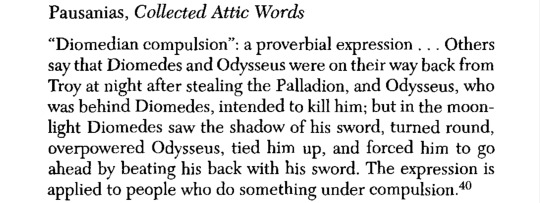
I believe the phrase Διομήδειος ἀνάγκη was pretty common back then in places like Attica, and if what Hesychius of Alexandria said was true, then the author of the Little Iliad might probably be the first one who connected this with the Palladium heist:

Although we still don’t know how it exactly played out in the Little Iliad (since Proclus in his summary didn’t elaborate either), I think it is interesting to see that this backstabbing story didn’t make it into pseudo-Apollodorus’s Epitome—the compendium which relied its account of the Trojan War on the Epic Cycle a lot. And if it didn’t make it there, chances are that the Little Iliad only left a hint of what could have been, meanwhile this story existed back then at a folklore level, just like the version of Odysseus’s death where a heron pooped on his head and he just…died. And pseudo-Apollodorus, as we know it, didn’t collect folklores as often as Pausanias did. So it never showed up even in the infamous Epitome.
Anyways, yeah, I don’t really think it has to do with Roman bias since little is shown in Pausanias’s works that he specifically hated certain heroes, even though there’s the Mantineia story concerning Penelope but you know he’s just collecting local tales as he always did. And here, the locals being the Athenians, it’s really intriguing to see how the people of a city patronized by Athena decided to shittalk abt Odysseus, favored by Athena, during the heist of the Palladium, the statue of Athena.
Heyo!
I don't know how exactly to phrase this but I was wondering if you know anything about Odysseus trying/planing to kill Diomedes while they were stealing the Palladium. I have heard some people say that Odysseus did try to kill Diomedes while doing so but Diomedes noticed him so Odysseus stopped.
This feels so strange to me as Odysseus and Diomedes aren’t antagonistic in the Illiad and Diomedes is loved by Athena like Odysseus so betraying him, especially for hubris, seems like a good way to end up on Athena's bad side.
Also the translated summaries of Little Illiad I know don't mention it either but I know those translations can be missing out context. I suspect the Odysseus Betrayal is a "later adition" to the Epic Cycle but I am not that confident on that opinion.
Yes absolutely and I understand completely what you say. That is because the Palladium Heist betrayal story was peobably not part of the original epic cycle but rather a later adittion. More specifically through the work called Bibliotheca by Photius I, the ecumenical Patriarch of Constantinopole in 9th century seems to be mentioning in his work a Roman mythographer named Conon.
Conon lived and created during the times of Augustus. It seems that he is one of the oldest if not the oldest mythographer to ever mention this story. So the story quoted by Photius goes as such;
Basically after the revelation of Helen's Diomedes and Odysseus enter the city. Odysseus helps Diomedes on his shoulders so that he could climb but when he reaches out his hand Diomedes doesn't take him in and goes for the Palladium himself. When he comes back apparently Odysseus asks him on it and, according to Photius who quotes Conon, Diomedes "knows his cunning" and says that he didn't find it. That a spirit stole it and that he has another one. Odysseus realizes he is lying so he eventually draws his sword to kill Diomedes and take the Palladium to the Greeks himself. Apparently as he goes to stab Diomedes in the back, his sword casts a shadow by the moonlight or the glint of the weapon, Diomedes sees it and deflects him. He draws his own sword and threatens Odysseus with it wishing to "punish him for his cowardice" but eventually he decides otherwise (arguably knowing that the war needs him) and thus he drives him back to the camp while hitting him on his back with the flat of his sword. And according to Photius this is what gave the famous phrase to Greek language διομήδεια ανάγκη (Diomedes Need) which basically means "do something unpleasant out of necessity for the greater good"
So as you see the story does seem pretty bizarre. First it implies mutual distrust and rivalry between the homeric heroes for Diomedes doesn't take Odysseus in the temple, Odysseus asks him on the Palladium obviously with intention to steal it and Diomedes lying to him and of course the actual act. For starters Odysseus ready to kill Diomedes for the sakes of fame (while he literally saves his life in the Iliad) and not only that, be greedy and stupid enough to hold a sword to the moonlight. So it holds many contradictions to the entirety of Epic Cycle even Iliou Persis which also shows a more unpleasant side of Odysseus.
My guess is that the story is mostly linked to traditions of later years especially Roman sources and is not directly linked to the Epic Cycle. Even art of later years doesn't depict the Palladium Heist as a negative aura between the two heroes. If anything they seem to be cooperating just fine. And as I said this myth as told by Conon shows BOTH Diomedes and Odysseus as rivals and equally antagonizing and deceiving each other which doesn't usually appear to the Epic Cycle. Although of course we cannot be 100% sure given how the Epic Cycle is lost, it seems to me more like a roman legend that usually depict Greek heroes of Troy in general and Odysseus in particular, in the most negative light possible given how Odysseus is known for taking Troy, the mythical city of origin to the Romans (given how Aeneas who barely escapes with his life from Troy is the ancestor of the founders of Rome)
I hope this answers your question; to summarize it seems to me that this story of the Palladium Heist has as much connection to the Epic Cycle as Ovid has to Medusa legend; seems more like a version either created or told by Conon based on traditions of his time and the general anti-Odysseus climate.
#another thing to mention is that non-Homeric cyclic Odysseus did indeed have a slightly different characterization#judging by the fragments and the summary we now have#I wouldn’t be surprised to see people back then talking abt him like this#as for the Little Iliad mention in that Lexicon…there’s always the possibility that Hesychius misquoted#sorta like how Eustathius misquoted the Nostoi?#Idk scholars were weird back then#tagamemnon#greek mythology#odysseus#the palladium#the palladium heist#the epic cycle#trojan war#lyculī commenta
91 notes
·
View notes
Text
I SWEAR BY ALMIGHTY RIVER
From another article on this, first, because it's also relevant:
"The barrister Paul Powlesland, who has acted for climate protesters, was called to jury service last week, and made judicial history by taking an oath on the thing most holy to him – not an ancient book, but a cupful of water from his local river in north-east London: “I swear by the River Roding, from her source in Molehill Green to her confluence with the Thames,” he said, “that I will faithfully try the defendant and give a true verdict according to the evidence.” Powlesland explained that he wanted to promote the idea of the sacredness of nature, and its place in the legal system. “I hope that many others follow suit,” he said, “and animism is soon found more regularly in our courts.” In fact, the practice has the oldest of precedents. The first recorded oaths in western literature were made by the Homeric gods, who were, you will recall, in the habit of swearing on the waters of River Styx. As Hesiod wrote, breaking such a vow had serious consequences: “And whoever of the gods, pours of this water, and swears on it, and does so falsely, he is laid flat, and does not breathe, until a year is completed; nor will he have ambrosia and nectar to eat, but be laid on his bed while the evil coma covers him.”
And from the main article:
“I explained that nature is my God and I believe the Roding to be sacred and I manifest love in action for her, and in all the things that I do for her, and it would be a really meaningful promise to me,” said Powlesland. “I dipped my finger into a cup of the Roding water and said that ‘I swear on the River Roding from her source in Molehill Green to her confluence with the Thames that I will faithfully try the case and give a true verdict according to the evidence.’ “I got a feeling from the judge that he felt the truth in my voice, that this was a meaningful, sacred promise to me. It wasn’t just me playing silly buggers.” Powlesland is also the co-founder of Lawyers for Nature, a group campaigning for elements of the natural world to be recognised in law in Britain. Rivers, lakes and rainforests have been given legal personhood in countries including New Zealand, Spain, Ecuador and Australia."
1K notes
·
View notes
Text
Homer starts meowing and chirping and pawing at the window like she did at the end of the game, only this time when Judge Bird looks out she sees Frey pacing up and down the sidewalk like an indecisive mess (Cuff is giving her shit about it the whole time, naturally)
So Judge Bird goes to coax her inside like she's a scared kitten herself and the second Frey steps foot inside the apartment Homer barrel rolls into her legs demanding pets, then while Frey's still trying to process this Homer climbs her like a tree, purring so hard Cuff bitches about it rattling him apart
Thinking about Frey eventually going back to NYC only to avoid seeing Homer because of the fear that and won't remember her. It that she'll have bonded to Judge Bird and not want to return to her.
#don't you give me sad feels!#I've been sick I don't need sad feels!!!#I'll take them and turn them into happy feels!!!!! D<#forspoken#forspoken spoilers#frey holland#forspoken homer#judge maya bird#AND ANOTHER THING. SAD FEELS MAKE ME CREATE NEW WIPs. THE INBOX IS FULL! STOP THAT!!!
11 notes
·
View notes
Note
hello! sorry if this is a strange question, but i've been trying to write my own retelling of the hymn of demeter, as a play set in modern-ish times of a countryside mother who is trying to get her daughter back from a corrupt legal system that's forcibly bound her to marriage to a powerful city man. i've always been more drawn to demeter and persephone's relationship more than hades and persephone, though this may due to me being aroace and having a good relationship with my mom lol.
anyways, a part in the play i've been struggling with is how to translate the famine demeter makes to force zeus and hades to listen to her. i was originally going for her grabbing a gun and going on a rampage in hades' luxury apartment complex to find her daughter, told through outside reports, but i'm not completely sure of that. the point here is that my version of demeter has no power in comparison to the judges and lawyers and ceos who rule the city, and therefore no power to reclaim the daughter that was taken from her in a 'legal' manner, so she needs to subvert these restrictions placed on her by doing something zeus and hades would have believed she would never dare to do
anyways ramble aside, i always appreciated your thoughts on the hymn of demeter, so i was hoping to hear what you think if possible :D
sounds interesting!!! I think the main things I would consider when thinking about how to 'translate' the famine Demeter causes to another setting would be 1) that it directly harms innocent parties who had nothing to do with the abduction and harms Zeus and Hades only indirectly through harming others, and 2) that's it's an inversion of her usual function as an agricultural goddess. she doesn't go attack Hades for kidnapping her daughter, or Zeus for permitting it, instead she does something that kills the people who honor them and all the gods through worship and sacrifice. might be interesting to imagine a contemporary Demeter who kills or otherwise destroys someone/something that Zeus loves or depends on?
but it's also very much a self-destructive action, maybe even more than it is targeted at Zeus or Hades, because she's killing the people on whom all the gods, including herself, rely for honors and sacrifices. and in the Homeric hymn it comes right after the Demophon episode, which suggests Demeter may be closer to/more entangled with humans than other gods... it's perhaps more harmful to her than it is to Zeus, which is why it's such an astonishing action to take-- her purpose is agriculture, and now she's destroying the very thing that makes up the essence of her being. but she doesn't care anymore. so there should be some element of irony somewhere in there as well. it's like a human destroying something wonderful and life-sustaining that they'd dedicated their life to building, partly to keep Zeus from deriving any benefit from it but maybe more just because none of it matters to her anymore, and causing tons of collateral damage.
20 notes
·
View notes
Note
Hello there, just some lil questions I wanted to ask: what do you think about Odysseus? Since I am still unsure if he is a good guy after all…and what do you think about the wooden horse ?
Sending best wishes :)
Hi!
Overall? I do like Odysseus.
The question about if he is a good or bad guy? I feel it depends a lot of which Odysseus we are talking about. The many different adaptational Odysseus, one can argue, but I feel it's unfair measuring homeric Odysseus in a good vs bad measure. This is something you can't really make with any homeric figure, not only Odysseus.
One thing I enjoy of Troy (2004) is how in this analogy with modern imperialism it positions Odysseus as a cunning king that remains subservient to the imperial power in order to secure his land. Ithaca is in this kinda third world country position to an United States-coded Mycenae and that is very interesting to see.
However, there is also the fact that the dynamic of Odysseus and Agamemnon resembles Gandalf and Denethor in the Return of the King. He is the only one seeing the bigger picture while this armchair general calling himself " King of Kings" (the movie makes its own specifical use of this epithet from the Iliad) takes the worst choices ever. In the context of the film, with Agamemnon in the middle of a power driven mystic delirium oathing to Zeus he will sacrifice 40.000 greeks smashing the walls of Troy, you really can't blame the guy.
At that point of the film, Agamemnon is pretty much like grief over Boromir crazy Denethor about to burn Faramir alive, only he is about to get them all killed to destroy Troy in memory of Menelaus. Odysseus reacts as a way to preserve everyone, just as Gandalf sort of taking command in the Siege of Gondor. Arguably, Paris also attempts the same with Priam when he tells him not to accept the horse, but fails.
Speaking of Troy (2004) Odysseus? Yes, he is meant to be one of the good guys. The movie responsabilizes Agamemnon for him having to come up with the trojan horse and for the brutality displayed on the fall of Troy. It's not about power for him anymore, it has became a personal vengeance. He is, essentially, doing to that city for Menelaus exactly what Achilles did to the corpse of Hector over Patroclus.
Now, if we get in mythological territory, things get more complicated. This is why I feel you can't really judge him on good vs bad mentality. Homeric/ Trojan Cycle Odysseus is not a " did nothing wrong" neither a " figure of evil" character. He has both very redeemable and very loathsome moments.
For example, he is a devoted parent. Despite being far away from his boy, Telemachus is his life. While all the other heroes describe themselves in name of their parents, he adresses himself publicly as " the father of Telemachus". However, he is the direct responsible for the death of two kids: encouraged the sacrifice of Iphigenia, and in some versions, killed by his own hand the baby boy of Hector to stop him from growing and possibly seeking revenge for the atrocities commited.
I do feel blaming him for the trojan horse would be as ridiculous as the people who hate on Hector for killing Patroclus. It's an act of war in a war story, the guy did what Athena inspired him to do in order to win. However, the especially vile atrocities commited during the fall of Troy are another story. With the all white cast of the film the thing got a bit unnoticed, but Troy (2004) introduced the concept of the trojan war as the first genocide of the West against the East. As my very first introduction to the story, this idea kind of stayed with me.
I hate what the greeks did in Troy, but the story itself brings them their karma. Am I pissed off about Astyanax and Andromache? Absolutely, but the gods punished Odysseus for me with that trip back home and Pyrrhus got disowned by Peleus to later get killed by Orestes. Most of the greeks turned out cursed, and the trojans ended up founding Rome!! I have nothing left to hate, gods balanced the universe for me.
( If you like to see greek karma in action, like I do, I recommend the book " The Talisman of Troy " by Valerio Massimo Manfredi. Despite it takes the post war greek pov of a wide variety of characters, but mostly follows Diomedes, it is cathartic from the trojan one. The conversation stopping the Aeneas vs Diomedes duel in italy is delicious when it comes to trojan catharsis.)
When it comes to mythological Odysseus, I fall on a middle ground. I am against those fully negative " Odysseus was a cheater asshole" narratives represented by stuff like Madeline Miller's Circe. However, I am not as forgiving of the heaviest Odysseus' wrongs as, let's say, some sections of the Epic fanbase.
And btw, he was not a cheater. When the options are " sleep with this goddess or risk her wrath", there is nothing much the man could have done even if it happened twice. The only time he had the capacity to consent was when Nausicaa got infatuated with him, and he didn't sleep with her. I just say people who hate on Odysseus for " cheating " are looking at the wrong reasons lol.
Books Odysseus is a complicated man, but I enjoy his character too.
( all but the Telegony, in this blog we pretend the Telegony never existed. It's such an OOC trainwreck, even if it's ancient, I refuse to take it in consideration.)
#the odyssey was a comfort book growing up for me#my first copy from back then was a censored one my mom read in highschool#( she went to school during a dictatorship regime so it was heavily censored.)#for a long time i didn't know the whole details#that being said i admit i feel a strange filial kind of love for odysseus#like he is my fictional dad i grew up reading about lol#so yes he is capable of despicable things and many of those make me angry#but at the end i am good with him#he got what he deserved for those#in what comes to the war i have a leaning towards pro troy stance#and I defend the trojan heroes from all the unfair slander they get#but i don't hate odysseus#asks#messages#odysseus#the odyssey#troy 2004
20 notes
·
View notes
Text
𝐓𝐡𝐞 𝐎𝐫𝐩𝐡𝐢𝐜 𝐙𝐞𝐮𝐬-𝐇𝐚𝐝𝐞𝐬
“Votive inscriptions frequently mentioned Pluto but very rarely Hades. Particularly at Eleusis, the Pluto cult was for a deity who, like Persephone and Demeter, was favourably disposed to humans. He was frequently portrayed as a majestic elder with a sceptre, ranch, cornucopia, pomegranate, or drinking vessel in his hand; sometimes he was accompanied by an eagle. His iconography resembled that of Zeus, and especially that of some chthonic personification of the ruler of the gods, above all Zeus Meilichios. We can now go a step further. The nearest equivalent to the contrast between Hades and Pluto as presented in the Theophile epigram can be found in the Orphic Hymns, which are assumed to have originated from the Τελεταί [rites] of the Dionysiac mystic circles in Asia Minor of the 1st–3rd centuries. Hymn 41 worships Antaia, i.e. Demeter, the goddess who had searched for her daughter in Hades and discovered her in ‘the sacred bed of the sacred chthonic Zeus’. This formulation in itself is not surprising because the name Zeus (as a synonym for a deity and ruler) was used in reference to Hades–Pluto as the ruler of the underworld. In an interesting, though, sadly, only partly preserved inscription from Appia-Murathanlar in the Tembris Valley (in 3rd century AD Phrygia) the deceased appeals to “Zeus, god of the dead [φθιμένων], Pluto” to protect his grave. The term “Chthonic Zeus” could, however, mean something more than a mere euphemism for the name Hades. The idea of defining Zeus as χθόνιος, κατα (χθόνιος) ἄλλος [Chthonic, like another (chthonic one)] or simply Hades had been present in ancient Greek literature from Homer to Nonnos. This was a sort of extension, aspect or ‘shadow’ of the universal power of Zeus in the kingdom of the dead, where he was the judge of the dead and also the consort of Persephone–Kore. Moreover, he was the provider of riches, Πλουτοδότης [ploutos-dotes: wealth-giver]; a personification which was abbreviated to Πλούτων [Pluto]. Among other things, he controlled the crops and it was to him (as well as to Demeter) that the farmers turned for the promise of a good harvest. These are hardly well known traditions today. Some scholars maintain that their obscurity is on account of the secret role they played in the mysteries. ... Therefore, the Orphics worshipped Pluto as the saviour and judge of the deceased, as Zeus χθόνιος [Chthonic]. They most likely assumed that Zeus had another embodiment of sorts in the underworld, in Hades. The effect of this assumption was the myth, known to us in several versions, of how Zeus had lain with Persephone (even though she was his daughter). The so-called great Orphic tablet of Thurii refers to the abduction of Persephone by Zeus, who then fathers her son, Dionysus. Their child was revered by the Orphics as Dionysus Zagreus, Dionysus Iacchus, which shows how much importance they attached to the love affair of that particular couple."
- Images of Eternal Beauty in Funerary Verse Inscriptions of the Hellenistic and Greco-Roman Periods. Leiden ; Boston, Brill, 2013.
18 notes
·
View notes
Text
In a recent post, I made the clame that Nicholas Donin was antisemitic despite being born Jewish. I don't expect many people to read it, but out of premature fear that people might try to refute that claim, I'm going to try and answer possible refutations I think may rise. But firstly, some background:
Donin was a French Jew during the 13th century, the student of Rabbi Yechiel of Paris. The latter name might tell you nothing - he was among the last of the Tosafot, a centuries-spanning school of Talmud learning in France and the surrounding area. As a matter of fact, the story at hand likely explains why this school of learning died out a generation or two later. Anyway, Donin was excommunicated by Rabbi Yechiel for rejecting the authority of the Talmud. The English Wikipedia phrases this rather awkwardly:
While the precise reason for his excommunication is not known, Yechiel himself claims that it was because Donin had become a Karaite, rejecting the authority of the Talmud along with the Rabbinic tradition of biblical exegesis.
Which, I mean, I suppose considering what followed we can't completely trust the person who excommunicated him on his reasons for said excommunication, now can we? But I'm digressing.
Following his excommunication, Donin converted to Christianity. He then went on to convince the pope that the Talmud is the root of Jewish evil, which led to the pope declaring that the Talmud needed to be rid of. A public dispute was held in Paris between a couple of Jewish rabbis - including rabbi Yechiel, among other significant rabbis of the time. In this disputation, where a book belonging to one religion was being judged by the metrics of another, the Jews were bound to lose. And so, twenty four carts full of Talmud manuscripts were burned at the Place de l'Hôtel-de-Ville (then knows as Place de Grève), and rabbi Yechiel fled from Paris to the land of Israel. Though there may be some historical debates on whether or not he made it. Donin himself has joined the Franciscan order prior to the disputation, and after writing a book against said order he was executed. So I suppose no one cane out of this story happy.
Anyway, refutations to Donin being an antisemite include: a. The term "antisemitism" was coined by Wilhelm Mar, a proud antisemite, by the end on the 19th century as a term for the scientific, race-based hatred of Jews. It would be anachronistic. b. Donin hated the Talmud, not Jews. c. "Donin was right in his hatred of the Talmud! Plus, he was excommunicated so he had good reason to hate Jews!"
The latter... Isn't a refutation. If anyone raises it, it's a confession that they themselves are antisemitic. I will talk of it regardless, because sadly part of the point of this post is prematurely preparing for people perpetuating disagreement over basic points.
Let's start with point a, then: it's anachronistic, and the term refers to the racist hatred of the Jewish people. Well, it is fully true that it's anachronistic. However, we're bound to use modern terms for things that occured prior to coining those terms. In the same manner, calling Achilles and Patroclus "homosexual" is also anachronistic because this term wasn't coined when Homer codified the Iliad. That doesn't stop the greek myth side of tumblr for calling them that. Obviously I can't take for granted that people accept this usage of relatively modern terms either, plus Donin likely didn't hate Jews based on race. To that, I can say two things: one, antisemitism is widely accepted currently as the word for Jewish haters of any kind. This is why I used this word, as it's universally understood as the term for that. Two, if you really insist on semantics, we can call him Yudophobe. Not a perfect solution, but this can be a term for people who hate the Jewish people based on things other than race. It could be very exciting, to get into the finer details of why a given person hates Jews! But that particular conversation is for another day.
So, point b: he hated the Talmud, not Jews. Which is dangerously close to point 3 actually. So, I'd like to point out: the Talmud is a religious book (or a series of books. Really, the definition of what is considered a singular book can be fluid) of the Jewish people. It's an inherent part of most of Judaism - the only actual exceptions being Karaites, with maybe secular Jews as well. Hating something that is inherent to a given culture is what we call bigotry - meaning hating said group. Making Donin and antisemite/Yudophobe.
As to point c... well... it doesn't even argue that Donin wasn't antisemitic. It just argues that he had reasons to be one and that thus it should be acceptable. It's hard to argue with this point, because it inherently undermines the basic assumption that antisemitism is bad. The question is, then: should it be handled as something that a person might raise? Should I assume that some people I talk to see antisemitism as acceptable under the right circumstances and try to argue with them on that? Or should I just cut them out as antisemitic themselves, since they allow antisemitism in their midst?
All things considered, I think this is a matter of axioms. So I don't actually think this point can be argued. Either you think antisemitism is unacceptable under every circumstance, or I really just can't discuss antisemitism with you. It's unacceptable because no matter how righteous you think your hatred of my people is, you still hate my people and want me dead. Kind of beats the point of discussion. One might argue that since Donin supposedly didn't hate Karaites he can't be considered an antisemite or Yudophobe. I don't think this is any better of an argument - being Rabbanicophobe or even hating just Orthodox Jews aren't really any more justifiable than hating Jews indiscriminately. In short: if you agree that he was a bigot but are trying to justify it by minimising it or rationalising it, I'm not sure you belong in this discussion.
Hope that was comprehensible, thank you for reading and have a good day!
11 notes
·
View notes
Text

Oswald Peraza gets an RBI homer, his first of the season, and the 9th home run of this game! It's only the 7th inning so this home run ensures that Aaron Judge will have another at bat!! The score is 20-6. Once they got rid of max fried, no one else has scored a run. They have had numerous pitchers for the Brewers, but they can't stop my boys!!
#Oswald Peraza#18#RBI home run#first of his season#congratulations 🎊#9th home run#a Yankees franchise record#you get a run!!#love#happiness#thank you#sharing#joy#beautiful#baseball#sports#ny yankees#ny baseball#Bronx bombers#i love this game#let's go Yankees!!!!!
21 notes
·
View notes
Text
What I say: a book-accurate adaption of Blood Meridian into film is very much possible. Due to BM's age, published in 1985, it has accumulated nearly 4 decades' worth of interpretation, discussed and analysed in academia and in the wider public sphere. One need only, for example, search for the novel on Spotify, and they’ll be met with a wealth of playlists and albums showcasing the vastly different lenses BM's readers have applied to the novel (a personal favourite of mine is Hellenica's sythensizer-spaghetti soundtrack). This goldmine of art, writing and music, not to mention McCarthy's own prose and dialogue, should make it ridiculously easy for any director to produce a halfway acceptable film that, by and large, ought to largely appease its long-awaiting fanbase.
Most detractors for a BM film cite the novel's extreme violence, but this, imo, is the easiest part to render for the silver screen. Full Metal Jacket and Apocolypse Now prove compelling showcases of the disorganised-organised chaos of war and the violence it wroughts in the hearts of its participants, with no short supply of dark humour, and even The Passion of the Christ portrays human cruelty and suffering with unflinching affect (see Acolytes of Horror's YT video). However, as is the curse of all adaptations of grand novels into grand films *gestures to Villeneuve’s Dune series*, it will never wholly meet the expectations of its hardcore readership, because novels (but especially in BM’s case) rely so heavily—by design—on the imagination of its audience. This is a work where the sun rises "out of nothing like the head of a great red phallus", and where "little devils with their pitchforks" are thought to skitter along the mouths of volcanoes, not to mention the immortal, 7ft tall, 150kg hairless albino who traipses the pulsing red horizon in search of souls to recruit for his plight of perpetual war. How, then, can a film best capture the mythopoetic haze that stains the sands of BM? It's doable, sure (see certain shots from Ken Russell's Altered States or Tarsem Singh's The Fall for the general vibe I'm trying to get at), but like with any calamitous attempt at adapting Homer's Odyssey (not including the 1968 mini series <3), how do you make a myth concrete without clipping its wings?
Like I mentioned earlier, I think the recent Dune films (another book series that, in the wake of Lynch's 1984 adaption, was likewise once considered too dense and rich for film) have opened people up more to the idea of a BM movie, or even a whole franchise (there's certainly enough material to go around, personally I'd enjoy a duology), some may make the mistake in wanting a literal, line for line, act for act, page to screen adaptation. And, yes, thanks to McCarthy's command of plot and prose, he certainly provides material, and with a few edits here and there made for time (*cough cough* James Robert Bell/the imbecile *cough cough*), it can surely be shaped into a 20-hour masterpiece—which I would definitely enjoy—but, nevertheless, a literal adaptation still runs the assured risk of losing that blood-red shroud of mysticsm which makes the world of Blood Meridian so intoxicating. A literal adaptation would reduce it to solely a Western, but, to me, it is placed better as a Thriller (my mind always goes to Harry Powell as Robert Mitchum in The Night of the Hunter whenever I imagine the judge's speeches) or an Epic (see Aguirre, the Wrath of God) or, even better, a Horror (like Come and See). In a way, though, Blood Meridian is so vast, so fantastical, that filming it in the desert, with an endless budget to spend on fake blood and stunt horses might, strangely, prompt other failings. It's partly why I personally would rather see it not expanded but condensed, confined and made abstract, forced into sets like the kind Eiko Ishioka designed for Mishima: A Life in Four Chapters or Joel Coen's stark and foggy sets on Macbeth. Music is another tricky thing. The only person I feel could do proper justice with BM's score would be Ennio Morricone (RIP), but Johnny Greenwood is a close second, then again I'm also tempted to suggest no score at all, like with No Country for Old Men. Tarrantino's playing of 'Apple Blossom' by The White Stripes during The Hateful Eight is an interesting way of evoking theme while not adhering to a film's time period, but it's only used best in small doses.
Considering half of BM's dialogue is in Spanish, though it would be marketing suicide, it would be cool if they didn't provide subtitles during the Spanish conversations in the film, keeping in line with how non-Spanish speakers likely felt when reading the book.
Of course, we haven't even touched on the subject of the kid. A big part of the novel is how McCarthy never lets us properly gauge the extent of the kid's participation in the Glanton Gang's slaughter and debauchery. He's no angel, certainly, but his heinousness is only determined by us, the reader. A film may feel compelled to flesh the kid out in ways that undo the intentions of the novel, marketing him as sympathetic or relatable in ways that threaten BM's basis of having no likeable (or even knowable) characters. He is a blank slate that shuffles from bar to brawl, apathetic but not passive and borderline suicidal. He has few defining traits other than his dark humour and his proclivity for mindless violence which he's harboured since birth. The kid is not Paul Atreides or Luke Skywalker, nor is he Holden Caulfield or Arthur Morgan, and if he ever met any of them, he'd either tell them to fuck off or shoot them, or both. He's hardly blockbuster material.
Of course, I'd still love to see the kid portrayed on film. Casting and marketing is another area worth considering for Blood Meridian, as I am of the opinion there should be few, if any known actors cast to play the Glanton Gang. The kid, especially, should be played by a Tennessean random, to keep in line with his anonymity as a character. Glenn Fleshler would absolutely kill it as Judge Holden, going off his performance in season 1 of True Detective. I don't know why, but I always envisioned Tobin as Andy Serkis, but he's probably still far too young for the role. Whoever they'd cast, I don't want to see a single set of veneers or drop of botox. Role them in dirt if you have to, I don't care. I don't want a single member of the Glanton Gang to look like they know what Ozempic is, and cast as many Native American actors and Mexican actors as possible.
Given BM's violence and characters, I worry for the kind of audience it'll attract, media literacy being what it is these days (*gestures at the hundreds of Judge Holden edits all wildly missing the point of his "Before man was, war waited for him" speech*). With the marketing, I take issue with casts of serious films and shows doing dumb promotional content, like those Buzzfeed puppy interviews. Considering the tough subject matter of Blood Meridian, I don't see why they'd need to do anything more involved than simple, respectful interviews and panels.
In the end, Blood Meridian can obviously be made into a film and it looks like we're finally getting one, whether we like it or not. But just because you can doesn't mean you always should, and though I can't say I won't be the first in line to watch, I also can't promise it won't be without obscenely high expectations. Every director is different, and though John Hillcoat's track record with McCarthy adaptations hasn't proved all that inspiring, I am nevertheless pleased to be seeing another person's interpretation of a novel that has captured by every waking moment ever since I read it over a year ago.
What I want to say: Blood Meridian should be a ballet/dance with little to no plot à la Ravel's Boléro or Stravinsky's The Rite of Spring (and mayyybe Akram Khan’s Giselle)
18 notes
·
View notes
Text
i, like every other fic author in existence, love getting comments from people who enjoyed my work. i don't care if your comment is "late" (that's so weird to me like it's literature—do you apologize to homer for being late to reading the odyssey?) or "unintelligible" (late night commenters, english language learners, people who feel like they "just aren't that good with words", believe me, i entirely understand what you mean and appreciate it immensely), or anything else that you feel might make your comment 'not good enough'. i love all of the comments i receive and i am eternally grateful to all of you for your continued support.
and yeah, i've read fics where i felt like adding a comment would be doing the fic a disservice because there was nothing that could be said that wouldn't cheapen or patronize the magnum opus i'd just witnessed. in instances like this, that is exactly what i say in the comment: "there's nothing i can say that doesn't do this work of art a disservice. thank you for writing this."
actually, now that i think about it, there are a bunch of ao3 comments i've gotten that i still haven't replied to because i felt any thanks i could give would be inadequate. i should really get around to replying because i want them to know how spellbound they left me. i love you all, have i ever mentioned that?
all of that being said, i would like to make a public service announcement!
at least under default settings, ao3 authors do get notified every time you edit a comment. i've accidentally hit send too early before, or realized i forgot something i wanted to say, i get it, i really do. i have edited many comments in my day.

but you don't have to do this. really, it's okay. most of the time i honestly can't tell what the difference is. i'm not going to think worse of you for having typos in your comments because i guarantee that there were more in the fic you just read sfkljghsl
also these edits were over the course of twenty full minutes. i got another email while writing this post and had to update the image. please do not spend 20 minutes agonizing over your comment and changing the capitalization and adding a few words. it's okay, i promise. i love your comment, and i'm very very grateful for it, regardless of how "polished" it is. i'm not your english teacher in disguise.
tl;dr, i love you all and i hope you don't feel anxiety or a compulsion towards perfectionism in my ao3 comments section. i won't judge you, i promise <3
#squido's op#squido rambles#i hope i don't sound annoyed because i don't want to sound annoyed#but also that was a lot of emails#if they were different comments that would be sick i love that#but on several occasions i've had edit spam#and i don't really understand the logic behind it#i figured that people just don't know that we get notified every time you edit a comment#so that's all i wanted to say really but i got sidetracked with appreciation because i think someone plugged some of my works somewhere#because i've been seeing a big uptick in comments lately and it's really really sweet#i haven't written for this fandom (or at all really) in a long time now so i'm always really really happy to see my works are still#out there and being read and loved and affecting people. i do still plan to finish hfwkadwm i promise#i guess i have writer's block >:/ never had it quite like this before#BUT I SAID I WAS GONNA FINISH IT AND I AM#MARK MY WORDS I'LL FINISH THIS FIC OR DIE TRYING#eventually
59 notes
·
View notes
Note
By the way, do you have the impression that Turgon and Thingoil are characters that I think Tolkien liked and admired much more than most people who write fanfics, that Tolkie really admired them and has better opinions of them than many people in the fandom in relation to fanfic about them.
Hi Anon!
I am probably not the most knowledgeable about fandom-wide opinions because most of the opinions I'm exposed to are from people on my dash that I've chosen to follow, and I read fic by and recommended by that community of people. That being said, I try to branch out and remain open to various interpretations. My experience participating in fandom this way has actually led me to a lot of people and writers with quite nuanced, generally favourable opinions on Turgon and Thingol! It's only from those people that I have heard that this is not necessarily the norm 😔.
Based on what I have heard and occasionally encountered, I do think Tolkien "liked and admired" Turgon and Thingol more than many readers in fandom, but, crucially, I don't think he was approaching them with the same mindset as most of those fans who take an unfavourable, even hostile, view of them.
I'm not an expert on Tolkien the Man, i.e. who he was as a person and how that was brought into his writing, but I do know that he was a scholar and enjoyer of literary traditions that did not follow the conventions of dominant contemporary storytelling. Many of the stories that inspired Tolkien were about legendary, epic heroes who were violent, fallible, selfish, etc... but still heroes -- basically because the genre said so. I didn't study Norse and Anglo-Saxon culture and traditions like Tolkien, but I did study Homeric literature a bit and the stories and heroes of the Silmarillion have always reminded me of those legends and characters (it's why I love it!).
I think it's impossible to reach a conclusive argument about the morality of or a verdict on the actions of e.g., Homer's Achilles or Odysseus. It can be diverting, an interesting mental exercise, creatively fulfilling, but I think the storytelling is ultimately incompatible with that kind of analysis. The characters just are what they are, and if the text says they are Great then they are. That's that.
I believe it's that way with Thingol and Turgon. We are told they are glorious and wise kings but a lot of what they actually do doesn't seem very glorious or wise. (Feanor is like this, too -- big time lol.) I think that's because the genre/traditions the Silm is inspired by do not necessitate that the story back up a character's "quality of excellence." We are just invited to accept it.
My sense is that that is not satisfying to many people (works for me though!). It is interesting to judge characters for their actions. It's what contemporary novels/TV/film/etc invite us to do, and many like doing it (again, not really me, but I'm strange).
(Tolkien's later writings, like LotR and some of the post-LotR writings, do invite this kind of reading, and I think that Tolkien at that stage was taking pains to show as well as tell us that X character was noble/wise/brave/etc. Which brings me to an issue that I think is at the root of so many interpretive disagreements about the published Silmarillion, namely that it's compiled from a selection of drafts written over decades and those drafts are not always compatible with one another in terms of genre and tone. Christopher did his darned best, and anyone who has read through HoMe will appreciate what an impressive job he did, but while he could iron out inconsistencies, without extensive rewriting -- which he was determined not to do -- I think incompatibilities like this were unavoidable. So we get Tinwelint from the 1917-19 Tale of the Nauglafring blended in a soup with Thingol of the 1950s Narn i Hin Hurin and the result makes for a bit of a strange aftertaste. There's even some full-on characterisation whiplash for those who are looking very very closely, as us fans like to do. Turgon is another character whose story is drawn from disparate strands of the Silmarillion's textual history, hmm... maybe something there.)
So, I have been theorising that all this is possibly why there seems to be a disconnect between Tolkien's presentation of characters like Thingol and Turgon and how much of the fandom receives and interprets them. Storyteller and reader are looking at things through incompatible lenses. Which is interesting! I think the problems (and vitriol) arise when people are not recognising that their opinions are filtered through a particular lens.
Probably far more than you were looking for with this Ask, but this issue has been circulating in my mind. I hope it makes some sense. I am trying to articulate half-formed thoughts through the fog of a head cold.
37 notes
·
View notes
Text
The Simpsons Season 13: My thoughts

Once again, I'm not sure what to say, this is more or less the same level of quality in writing as the last two. I'll say this, I like the arcade theme of this boxset. Some of the boxset art has references to the original Simpsons arcade game so that's pretty neat.
Favourite Episodes:

Homer the Moe
Again, Moe episode, you can't lose.

A Hunka Hunka Burns in Love
Seeing Mr. Burns date a younger woman may seem weird but Homer as his wingman makes it work. Of course, she leaves him for Snake Jailbird at the end but I like how she's still Snake's girlfriend in later episodes, nice bit of continuity.

Sweets and Sour Marge
I do understand both sides of the conflict but this mostly makes the list because of the comedy.

Jaws Wired Shut
Homer's injury seems painful but the way it changes him is nice, and the way it affects Marge is a nice bit of irony.

The Old Man and the Key
Grandpa getting his license and his roadtrip are pretty neat, not to mention this led to one of my favourite Simpsons memes, that being "Old man yells at cloud". But I especially like how Grandpa confronts Zelda at the end.

Blame It on Lisa
Even with the massive controversy this episode faced, I think this episode is hilarious.

Weekend at Burnsie's
Even though the film parody the title implies doesn't come into play until the last five minutes, this episode is pretty good.

I Am Furious (Yellow)
The internet parody, Stan Lee, the school presentation at the start, etc. This Episode has SO MUCH good stuff going on!

Little Girl in the Big Ten
Lisa pretending to be a college age student and getting away with it seems a bit far fetched but the Romanian gymnast, Bart in a bubble and Skinner's ceremony makes this episode a gem for me.
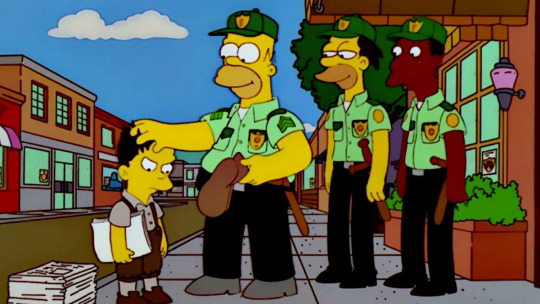
Poppa's Got a Brand New Badge
Homer's Neighbourhood watch is surprisingly competent and I just like the episode as a whole.
Not so Favourite Episodes:

The Parent Rap
Don't care for the judge character they introduced in this one, she's incredibly unlikeable. I get that that was intentional but I think they did too good of a job if that makes sense.
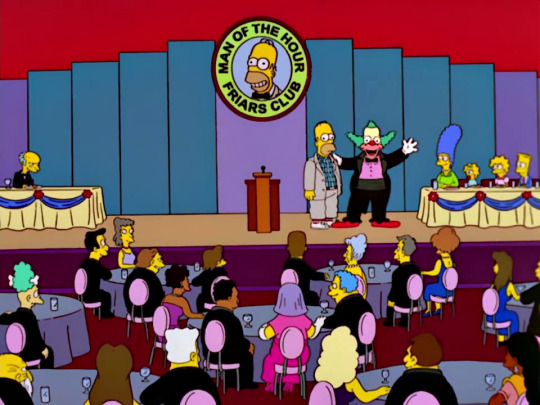
Gump Roast
Really? Another clipshow? Well, at least the song at the end is good.
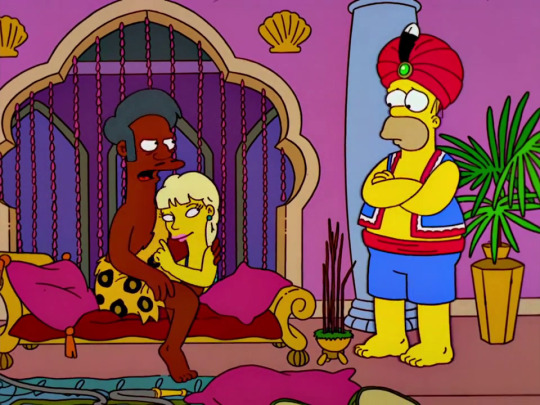
The Sweetest Apu
Maybe it's just me but it seems a bit out of character for Apu to cheat on his wife. I love the civil war reenactment at the start though.

The Frying Game
I'm sorry but Homer and Marge being framed for a murder they didn't commit, no one believing them and getting sentenced to death all as part of an elaborate prank show just isn't all that funny to me. I really hope Homer and Marge took Frame Up to court.
Okay screw it, I'll talk a bit about the "Blame It on Lisa" controversy.

Apparently around this time, Brazil spent a lot of money on a tourism campaign aimed at America to get people to go on holiday in Brazil but then The Simpsons did this episode where they go to Brazil and sort of depicted it as a monkey infested slum full of conga lines, criminals, soccer and kids shows with sexual themes. I don't know if any of these jokes were based in reality but Brazil was pissed at this and threatened to sue. I don't know if anything came from this but that was apparently what happened.

Well, season 14 is next, let's hope I have more to say about that one.
2 notes
·
View notes
Text
Mr. Burns (and Smithers) in Bart Gets Hit By A Car, episode 2x10
---
Overview: Homer is convinced to file a $1 million lawsuit by a dodgy lawyer after his boss at the power plant, Mr. Burns, hits Bart with a car.
---
BART rides into the street on his skateboard and is hit by Mr. Burns. Smithers insists they call an ambulance. Mr. Burns mutters in irritation.


---
Homer meets with Burns to discuss a cash settlement. Mr. Burns offers Homer $100, but Homer says that won't even cover the medical bills. Mr. Burns thinks Homer is trying to extort him so takes the money back.



---
Homer sues Mr. Burns for $1,000,000. Mr. Burns tells Smithers to fire Homer, but Smithers states that'll be bad for his image. Mr. Burns decides instead to bide his time and wait to strike.


(I love that this is what Mr. Burns imagines the headlines will be haha)
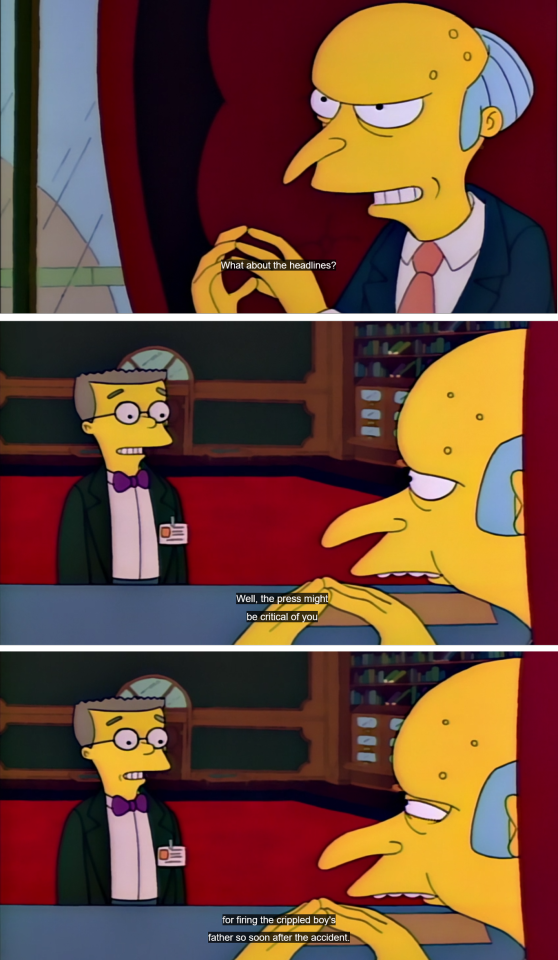


(Mr. Burns' body language and expressions in this sequence are brilliant)

---
They take it to court. (This bit is hilarious.) Bart tells his side of the story, Mr. Burns tells his. They're both extremely exagerated versions of the story, where they are innocent and the other is an utter fiend.

"I should be able to run over as many kids as I want!" - Mr. Burns (I'm going to randomly post this image alone without context after I finish this and see what people do)
Bart tells his story. He says that he was skateboarding very innocently when suddenly Mr. Burns appeared, hunted him down and deliberately hit him.


(I need to draw Mr. Burns with sharp teeth now, they did it a couple times in this episode!)
And this is Mr. Burns side of the story. He claims he was driving some toys to the orphange when Madman Bart rammed into his car. Mr. Burns says he got out and showed incredible compassion! "Take me! I'm OOOLDDD!!!"

(The license plate hahaa, I wonder if that was in his story as he told it. "I was driving one of my very few automobiles; one of which is the color of pink, is adorned with flower decals and has a license plate that reads Luv One.")

(Hahahahahhaaa!)


"And that's what happened." (Smiles deviously and is clearly very pleased with himself)

---
Nobody believes Mr. Burns' story. They believe Bart. Homer and Marge meet with Mr. Burns, where he offers them a $500,000 cash settlement. He and Smithers then leave the room and spy on the two. Homer doesn't want to take the $500,000 because he wants 1 million instead. Marge goes on to express her disappointment at what Homer has become and what he's doing to get money from Burns. She says Bart's doctor was a phony, and Mr. Burns (having been eavesdropping) returns to the room and says the deal is off.
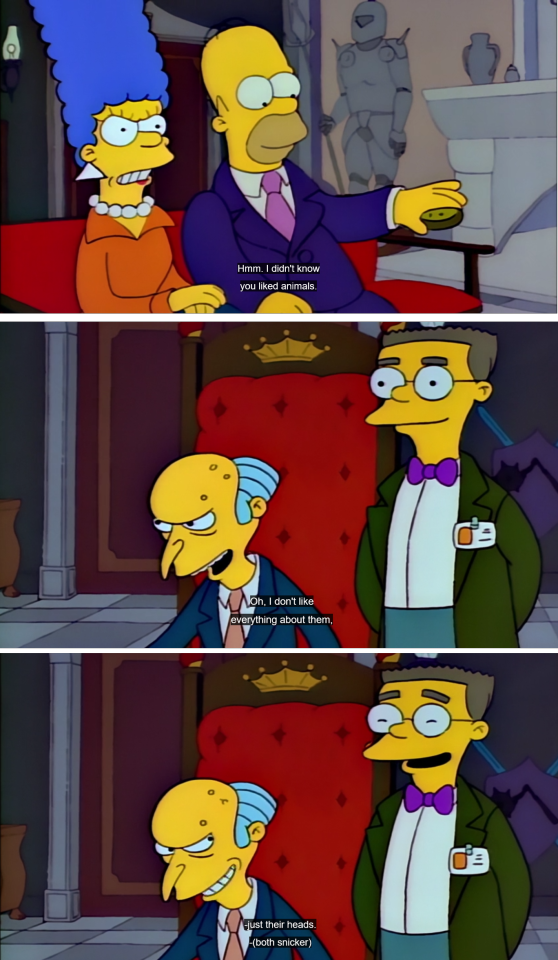
(He's so evil lol)

(So funny, they show you that he originally wrote down $800,000 but changed it to $500,000. And then added a little smiley face to entice them.)

(Love this shot, the room is so cool. His chair, the rug, the armor statue, the tiled floor. I also like when he goes BUP-BUP-BUP!)

(Another "Smithers is Mr. Burns lap dog" reference.)

---
The judge calls Marge to the stand, who doesn't lie. Mr. Burns wins the case. He then offers Homer a handsome sum of $0 dollars. Haha




The End (of Mr. Burns/Smithers scenes).
#Mr. Burns#Mr Burns#Waylon Smithers#The Simpsons#Bart Gets Hit By A Car#My Simpsons Posts#my collection of mr. burns' scenes
6 notes
·
View notes
Text
Dio Chrysostom, On Kingship 3.1
When Socrates, who, as you also know by tradition, lived many years ago, was passing his old age in poverty at Athens, he was asked by someone whether he considered the Persian king a happy man, and replied, "Perhaps so"; but he added that he did not really know, since he had never met him and had no knowledge of his character, implying, no doubt, that a man's happiness is not determined by any external possessions, such as gold plate, cities or lands, for example, or other human beings, but in each case by his own self and his own character.
Now Socrates thought that because he did not know the Persian king's inner life, he did not know his state of happiness either. I, however, most noble Prince, have been in your company and am perhaps as well acquainted with your character as anyone, and know that you delight in truth and frankness rather than in flattery and guile.
To begin with, you suspect irrational pleasures just as you do flattering men, and you endure hardship because you believe that it puts virtue to the test. And when I see you, O Prince, perusing the works of the ancients and comprehending their wise and close reasoning, I maintain that you are clearly a blessed man in that you wield a power second only to that of the gods and nevertheless use that power most nobly.
For the man who may taste of everything that is sweet and avoid everything that is bitter, who may pass his life in the utmost ease, who, in a word, may follow his own sweet will, not only without let or hindrance but with the approval of all—when that man, I say, is at once a judge more observant of the law than an empaneled jury, a king of greater equity than the responsible magistrates in our cities, a general more courageous than the soldiers in the ranks, a man more assiduous in all his tasks than those who are forced to work, less covetous of luxury than those who have no means to indulge in luxury, kindlier to his subjects than a loving father to his children, more dreaded by his enemies than are the invincible and irresistible gods—how can one deny that such a man's fortune is a blessing, not to himself alone, but to all others as well?
For in the case of the generality of men, those either in private station or holding some petty office, the individual's personal fortune is of slight account and concerns himself alone; but let untold cities yield obedience to a man, let countless nations be governed by his judgment, let tribes of men unnumbered and hostile to one another look to his prudence alone, and that man becomes the savior and protector of men everywhere—that is, if such be his type.
For when a man governs and holds sway over all mankind, his prudence avails to help even the imprudent, since he takes thought for all alike; his temperance serves to restrain even the intemperate, since his eye is over all alike; his justice gives of itself even to the unjust; and his courage is able, not only to save the less valiant, but even to fire them with greater courage.
For no one is such a coward as not to feel reassured when he follows a general with whom victory is certain, nor so exceeding indifferent as to sit at ease when he sees submitting to take orders that man to whom God has apportioned the right to give orders only, nor, again, so completely lost to a sense of shame that he can watch a man toiling in behalf of another although under no necessity to toil—and yet refuse him aid. This, it seems to me, is exactly Homer's view as well; for, after speaking of the ideal king, he concludes by saying,
And virtuous the people beneath him.
Such a king considers virtue a fair possession for others but an absolute necessity for himself. Who, in fact, must exercise greater wisdom than he who is concerned with the weightiest matters; who, a keener sense of justice than he who is above the law; who, a more rigorous self-control than he to whom all things are permissible; who, a stouter courage than he upon whom the safety of everything depends? And who takes greater delight in the works of virtue than he who has all men as spectators and witnesses of his own soul?—so that nothing he may do can ever be hidden any more than the sun can run its course in darkness; for, in bringing all other things to light, it reveals itself first.
These things I say in the full knowledge that my present statements will have to be repeated at greater length; and yet there is no danger of my appearing to speak aught in flattery, since I have given no slight nor fleeting evidence of my sincerity. If, in bygone days when fear made everyone think falsehood a necessity, I was the only one bold enough to tell the truth even at the peril of my life, and yet am lying now when all may speak the truth without incurring danger—then I could not possibly know the time for either frankness or flattery.
Again, all who act deliberately do so either for money, for reputation, or for some pleasurable end, or else, I suppose, for virtue's sake and because they honor goodness itself. But I could never bring myself to accept money from anyone, although many are willing to give it. Nay, little as I had, you will find that I not only shared it with others, but actually squandered it many a time. And what sort of pleasure was I seeking, when even those flatterers who openly follow the business acknowledge that to play the flatterer is of all things most distasteful? For what pleasure is there in praising someone else undeservedly merely to be deservedly blamed one's self
Furthermore, flattery seems neither reputable nor honorable even when practiced to gain distinction, or from some other worthy motive. Nay, of all vices, I may say, flattery will be found to be the meanest.
In the first place, it debases a thing most beautiful and just, even praise, so that it no longer appears honest or sincere, and—what is most outrageous—it gives to vice the prizes of virtue. Flatterers, therefore, do much more harm than those who debase the coinage: for whereas the latter cause us to suspect the coinage, the former destroy our belief in virtue.
Then again, as I see the matter, we always call the bad man a fool, and so he really is; but for downright folly the flatterer outdoes all, since he is the only perverter of the truth who had the hardihood to tell his lies to the very persons who know best that he is lying. For who does not know his own business? Or who is so stupid as not to know whether work or idleness brings him joy, whether he finds pleasure in over-reaching another or in acting justly, and whether he is the slave of pleasure or a lover of noble deeds?
And, further, it seems to me that the flatterer fails worst just where he is most confident that he is succeeding—namely, in pleasing those whom he praises. Nay, he is odious rather than pleasing to them unless they be utter fools.
For example, he who congratulates a poor man on his wealth not only lies himself, but holds up to scorn the poverty of the man he congratulates. Again, does not he who praises a most ugly person for his beauty simply cast his ugliness in his teeth? Or how could he who calls a cripple able-bodied please him by reminding him of his misfortune?
The man, however, who lauds the fool for his wisdom is perhaps the most convincing of all on account of the stupidity of his hearer and thus does all the greater harm, since he induces the fellow to take his own counsel and not trust to intelligent men. But the man who extols the coward as a hero makes the most justifiable use of the folly of him who is flattered; since, if the craven believes him and attempts to perform heroic deeds, he will come to grief all the more speedily.
Yet, generally speaking, when the flatterer is found out, he is not only condemned, but hated as well, since his words are thought to be mockery; while, if he convinces one of the truth of his words, he gets no very great thanks.
For what great favor is he thought to confer by simply telling the truth? Besides, he is a much greater rascal than a lying witness: for the latter does not corrupt the judge, he merely deceives him; but the flatterer corrupts at the same time that he praises.
IMAGE: The Emperor Trajan
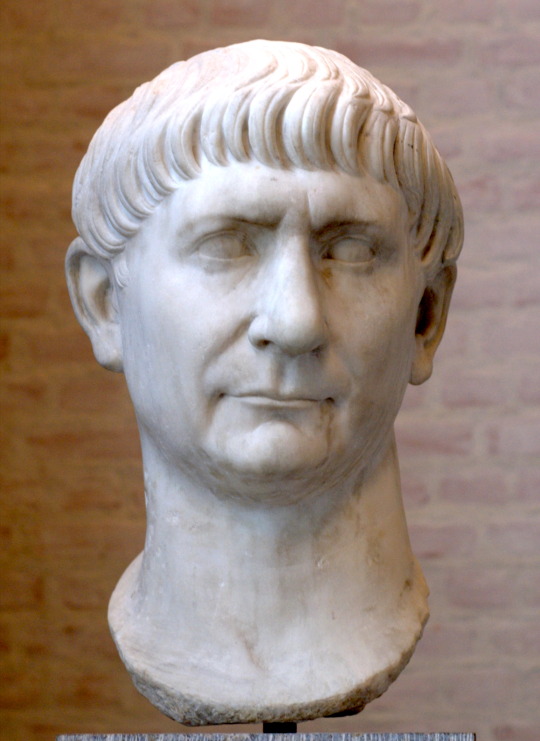
2 notes
·
View notes